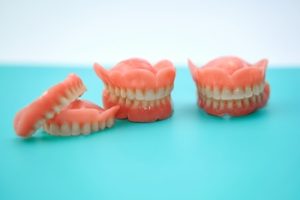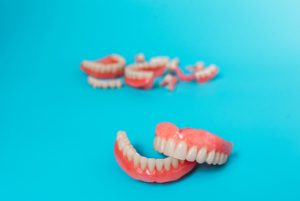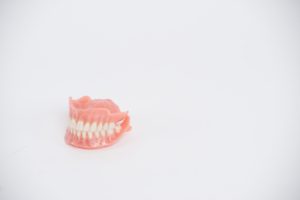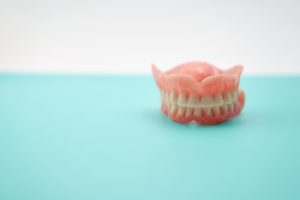Types of Dentures — Explore Replacing Missing Teeth Options

When it comes to denture solutions for missing teeth, various options are available. Determining which type of dentures would work best for you and your specific needs can be daunting. The good news is that we are here to help. Are you searching for information about the various kinds of dentures? Look no further! Here is a concise yet comprehensive review of all your options available so that you can make the best decision for your oral health and dental care.
Are you wondering what dentures are?
Dentures are prosthetic devices that replace missing natural teeth due to either natural tooth loss or injury. They look and feel like natural teeth, providing a natural-looking and comfortable solution for those who have lost teeth. Depending on your specific situation, dentures can be made to fit over the remaining natural teeth or attach to existing dental implants for additional stability. With the help of dentures, those with missing or damaged natural teeth can have their smile back and even improve their ability to speak, chew and enjoy life.
How does wearing dentures benefit your health? 
- Improved self-confidence: Wearing dentures can help restore the appearance of your smile and thus boost your self-confidence.
- Easier chewing: Dentures can make it easier to chew food, as they replace missing teeth and provide structure for the remaining teeth to work together efficiently.
- Improved speech: Dentures can also help improve one’s speech, filling in the gaps between teeth and creating a smoother surface for sound to travel through.
- Better nutrition: With dentures, eating nutritious foods that would otherwise be difficult to chew without all of your teeth becomes easier.
- Maintain facial muscle tone: Dentures can help maintain the proper structure of the face by replacing lost teeth and preventing the facial muscles from sagging.
- Reduced risk of gum disease: Using dentures can reduce the risk of gum disease as they fill in gaps between teeth and make it difficult for bacteria to build up and cause infection.
Who can benefit from wearing dentures?
Dentures can be a great solution for anyone missing one or more teeth. They both have pros and cons, but there are many situations in which dentures offer superior benefits compared to other solutions. For instance, one option available is temporary dentures, which, as the name suggests, offer a cost-effective and temporary solution for those looking to improve their aesthetics while waiting for a more permanent solution. However, permanent dentures provide just that for individuals seeking more long-term stability – an appliance designed to remain in place with added comfort, allowing confidence and a natural smile no matter the situation.
Process of getting a denture
Getting a denture can be intimidating, but the rewards are worth it. To begin with, it’s important to consult with a dentist or prosthodontist to get a proper examination and prescription for your dentures. Then you’ll need to select the material you’d like your dentures made of, such as partial or complete acrylic resin or metal alloy plates. After that, you’ll need to get impressions taken by the lab, along with measurements and other specifics related to designing your dentures. Finally, once these steps are complete and all necessary adjustments have been made, your custom-made dentures will be ready. With proper care and maintenance following the fitting of your denture, you can enjoy a beautiful smile for years to come.
Different Types of Dentures
Partial Denture
Partial dentures are ideal for patients who only need to replace a few missing teeth in their smile. These removable appliances consist of artificial teeth attached to a plastic base on top of the gums, with metal clasps that fit securely around existing teeth for added stability.
 Partial dentures help restore function and aesthetics in cases where only some natural teeth remain. Removable partial dentures (RPD) are more comfortable than conventional dentures because they rely on the remaining natural teeth to support them.
Partial dentures help restore function and aesthetics in cases where only some natural teeth remain. Removable partial dentures (RPD) are more comfortable than conventional dentures because they rely on the remaining natural teeth to support them.
That reduces the amount of pressure and soreness that might be experienced when wearing a full set of dentures.
Complete dentures
Complete or Full Dentures are used when the patient’s teeth have been lost or extracted due to decay or injury. They consist of a full set of false teeth attached to a flesh-coloured acrylic base that fits snugly over the gums and lips. Complete dentures improve aesthetics and help restore chewing function so patients can enjoy all their favourite foods again without difficulty.
Immediate Dentures
Immediate dentures are designed to be worn immediately after extraction surgery while the mouth is still healing. These temporary appliances allow patients to maintain their appearance during this period and help them adjust more easily to life without natural teeth during recovery time before conventional complete dentures are ready to be fitted later on down the line.
Removable Dentures
Removable dentures come in partial and complete varieties and offer patients a way to replace their missing teeth by attaching artificial teeth that can be taken out at night or whenever they choose. That is an ideal solution for those who want more freedom regarding their mouth health care routine or more flexibility when cleaning their mouth after meals or snacks.
Conventional Dentures
Conventional dentures are full sets of fabricated teeth from acrylic resin and other materials that fit directly onto the gums and jawbone instead of missing natural ones. A conventional denture offers more stability than immediate or partial dentures since they fit much more snugly against existing bone structures in areas where natural teeth have been lost or extracted due to disease or decay over time. Unlike immediate denture appliances, conventional ones must be custom-made by a dentist using precise measurements taken from the patient’s mouth before they can be worn comfortably and effectively in place of natural ones lost due to injury or decay over time.
Flexible Dentures
Flexible dentures are a new dental advancement that is changing the way people wear dentures. Offering a more comfortable and reliable fit than traditional dental appliances, flexible dentures consist of an inner core of flexible nylon resin surrounded by two layers of dental vinyl.
 To adhere the dental appliance to the gums, flexible dentures don’t need to be glued on permanently with dental adhesives; they are designed to fit snugly in the mouth without the need for extra assistive devices. Unlike rigid dental materials, the flexible material allows users to make even small adjustments to their dental prosthetic if needed without dealing with uncomfortable and sometimes painful fitting processes. Loose dentures are quickly becoming one of the most popular dental solutions for patients who need them – transforming how we wear our dental appliances.
To adhere the dental appliance to the gums, flexible dentures don’t need to be glued on permanently with dental adhesives; they are designed to fit snugly in the mouth without the need for extra assistive devices. Unlike rigid dental materials, the flexible material allows users to make even small adjustments to their dental prosthetic if needed without dealing with uncomfortable and sometimes painful fitting processes. Loose dentures are quickly becoming one of the most popular dental solutions for patients who need them – transforming how we wear our dental appliances.
Overdentures
Overdentures are an alternative tooth restoration option for people with tooth decay or missing existing teeth. Unlike traditional Complete dentures, which rely entirely on soft tissue support structures below the gums, overdentures utilise a combination of tooth roots and implants connected to the jawbone. That allows a stable support system while reducing oral discomfort compared to traditional denture-only solutions. Overdentures are an ideal solution for patients looking for a longer-lasting tooth restoration and improved chewing and speaking capability.
Upper dentures
Upper dentures replace all missing upper teeth in the upper jaw, creating a full upper arch. They can be used to improve aesthetics and make it easier to speak and chew food. Depending on your situation, upper dentures may consist of an acrylic base or cobalt-chrome framework secured with implants for additional stability. Your dentist is the best resource for determining which denture type is best for your specific needs — whether a partial or complete upper denture. With proper maintenance and care, upper dentures can provide decades of service to improve your confidence, functionality, and oral health.
FAQs
What are dental implant-supported dentures?
They, also known as snap-in dentures, are dental prosthetic replacement teeth securely held in place through dental implants.
Dental implantation involves surgically placing small titanium screws into either the upper or lower jaw, depending on the location of the new teeth.
 Once the implantation is complete, specially designed replacement teeth that attach to the dental implants can be affixed. This type of dental prosthetic offers a secure and aesthetic solution over traditional dentures, which rely on dental denture adhesive and clips to stay in place.
Once the implantation is complete, specially designed replacement teeth that attach to the dental implants can be affixed. This type of dental prosthetic offers a secure and aesthetic solution over traditional dentures, which rely on dental denture adhesive and clips to stay in place.
With implant-supported dentures, you’re assured that your dental replacements won’t slip around when you speak or eat, allowing you to smile confidently.
What is the difference between implant-supported dentures and implant-retained dentures?
Implant-supported dentures are designed to be securely held in place by dental implants, while implant-retained dentures are only held by small metal clips that attach the prosthesis to the implants. Implant-supported dentures offer a more secure and aesthetic solution, while implant-retained dentures can be removed without the assistance of a dental professional.
Will dentures change the way I speak?
Yes, dentures can potentially change the way you speak. When you have missing teeth, it can be difficult for sound to travel through your mouth and make its way out. Dentures help fill in the gaps created by missing teeth, which helps create a smoother surface for sound to travel through, making it easier to articulate words properly. You can get used to speaking with dentures with practice and adjustment, and your speech should return to normal.
Conclusion
When the time comes to replace your missing teeth, there is no one-size-fits-all approach; each patient’s needs will differ depending on their unique situation, such as how many teeth remain intact or whether implantation surgery has already been performed before fitting conventional complete or partial dental appliances into place later on down the line. We hope this overview has given you helpful insight into the various types of dental prostheses available so you can decide what kind will work best for you based on your circumstances!
No matter what type you choose, rest assured that My Local Dentists will do everything possible to ensure your comfort throughout every step in your journey towards improved oral health! Book your consultation today; call us at (02) 9000 1239.
Note: Any surgical or invasive procedure carries risks.
References
Dentures: Types (Partial and Complete), Cost, Cleaning, and More | WebMD
https://www.webmd.com/oral-health/dental-health-dentures
What Are Dentures? Types, Care, & Benefits | Cleveland Clinic
https://my.clevelandclinic.org/health/articles/10900-dentures
Dentures (false teeth) – NHS
https://www.nhs.uk/conditions/dentures/
